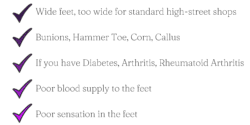Not everyone with diabetes needs specialist shoes BUT people with sensitive feet may benefit greatly from a good pair of shoes. Everybody needs to wear shoes that fit their feet well.
Do you suffer from any of the following:
Here is our top tip to help you choose shoes that not only fit well but feel great too.
Stand on a piece of paper and get somebody to draw around your foot. Cut around the outline with a pair of scissors. Place the template in the shoe. If it fits without being forced or leaving big gaps, then that shoe will also fit your foot.
What to look for in a good shoe?
Retention
A good lace, strap or Velcro fastening is essential for keeping the shoe on your foot and preventing rubbing. It also allows the shoe to be adjusted if your feet swell during the day.
Slip-on shoes are very bad for feet as they cause us to claw our toes to keep the shoe attached to our foot. This can cause extra pressure on the soles and toes. Some slip on shoes is being marketed as being good for our feet and designed for exercise such as walking. This is not the case and they should be avoided.
Spacious Toe Box
The toe box should be the right shape and size to make sure that it doesn’t rub on toes.
Heel Height
High heels are bad as they cause pressure on the balls of our feet which can lead to callous, corns and even ulcers. Ideally, heels should be less than 2 inches.
Enclosed
Shoes should be closed-in, especially if you have reduced sensation in your feet in order to prevent pebbles and other small objects from entering which may damage feet
Cushioned Sole
A thick cushioned sole helps to reduce the pressure on feet as we walk and make us feel more comfortable.
Specialist Socks
If your feet swell during the day or if you have been told by your health care professional that you have problems with the feeling in your feet, then Diabetes specialist socks are a good idea. They are wider than normal socks to allow for swelling and have no seams that may damage your sensitive feet.
A Podiatrist is trained to deal with all foot issues, mild and chronic. If you are considering investing in Medical/Specialist Footwear, we recommend you buy shoes via a podiatrist rather than through a traditional shoe shop.
Book an Appointment to have your feet assessed and view our range of Specialist Shoes.
Dublin 01 842 6273 Cork 021 427 4229



